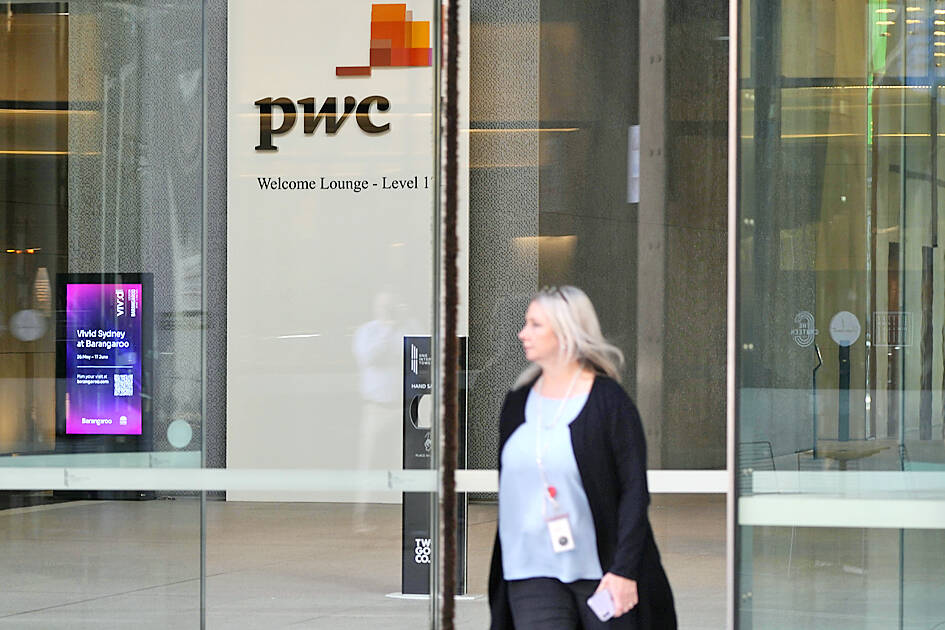Geopolitical conflict risks constitute the top worry among Taiwan’s chief executive officers, far higher than their global and Asia-Pacific peers, as their concerns over inflation ease, PricewaterhouseCoopers (PwC) Taiwan said yesterday, citing an annual worldwide survey of CEOs.
Globally, 38 percent of CEOs are expecting improved economic growth this year, while the proportion rises to 40 percent among Asia-Pacific counterparts and up to 48 percent among local business leaders, according to the survey that gathered responses from 4,702 CEOs worldwide.
The sentiment findings on economic outlook suggested a pickup of double percentage points from last year as global monetary tightening and inventory adjustments come to an end, the consultancy firm said, pointing out that the uptick reached 30 percent in Taiwan.

Photo: AP
Although business leaders are more optimistic about the economy, geopolitical conflicts remain one of the main threats and enterprises have begun to shift their global supply chains into regional supply chains to curtail risks and maintain normal operations, it said.
The survey showed that 39 percent of Taiwanese CEOs believed that geopolitical conflicts pose a major threat to their businesses, higher than their global and Asia-Pacific peers, both at 18 percent.
Against that backdrop, companies need to abandon old mindsets and chart out new organizational structures, and set up branch offices overseas with substantial operational functions when making regional deployments, PwC Taiwan chairman Joseph Chou (周建宏) said, adding that companies need to make the best use of digital tools, build multinational management teams and tap local talent pools toward that end.
The survey showed that CEOs have had mixed success at meeting their climate change-related objectives.
About 66 percent of the respondents said they have efforts underway to enhance energy efficiency and 10 percent said they have completed such initiatives.
About 50 percent of respondents indicated they have work in progress to innovate environment-friendly products or services.
The survey indicated that CEOs in western Europe are more likely to have energy efficiency and climate-oriented innovation initiatives in progress or completed, while CEOs everywhere else accept lower hurdle rates for climate-friendly investments.
Companies are stepping up efforts to move toward the target of net zero carbon emissions, but they face many challenges, the survey showed.
In Taiwan, 75 percent of respondents said “complicated regulations and frequent changes” pose the biggest challenges for companies to reduce carbon emissions, while low investment returns on climate-friendly investments and the lack of such technologies are serious hurdles, it said.

SETBACK: Apple’s India iPhone push has been disrupted after Foxconn recalled hundreds of Chinese engineers, amid Beijing’s attempts to curb tech transfers Apple Inc assembly partner Hon Hai Precision Industry Co (鴻海精密), also known internationally as Foxconn Technology Group (富士康科技集團), has recalled about 300 Chinese engineers from a factory in India, the latest setback for the iPhone maker’s push to rapidly expand in the country. The extraction of Chinese workers from the factory of Yuzhan Technology (India) Private Ltd, a Hon Hai component unit, in southern Tamil Nadu state, is the second such move in a few months. The company has started flying in Taiwanese engineers to replace staff leaving, people familiar with the matter said, asking not to be named, as the

The prices of gasoline and diesel at domestic fuel stations are to rise NT$0.1 and NT$0.4 per liter this week respectively, after international crude oil prices rose last week, CPC Corp, Taiwan (台灣中油) and Formosa Petrochemical Corp (台塑石化) announced yesterday. Effective today, gasoline prices at CPC and Formosa stations are to rise to NT$27.3, NT$28.8 and NT$30.8 per liter for 92, 95 and 98-octane unleaded gasoline respectively, the companies said in separate statements. The price of premium diesel is to rise to NT$26.2 per liter at CPC stations and NT$26 at Formosa pumps, they said. The announcements came after international crude oil prices

SinoPac Financial Holdings Co (永豐金控) is weighing whether to add a life insurance business to its portfolio, but would tread cautiously after completing three acquisitions in quick succession, president Stanley Chu (朱士廷) said yesterday. “We are carefully considering whether life insurance should play a role in SinoPac’s business map,” Chu told reporters ahead of an earnings conference. “Our priority is to ensure the success of the deals we have already made, even though we are tracking some possible targets.” Local media have reported that Mercuries Life Insurance Co (三商美邦人壽), which is seeking buyers amid financial strains, has invited three financial

CAUTION: Right now, artificial intelligence runs on faith, not productivity and eventually, the risk of a bubble will emerge,’ TIER economist Gordon Sun said Taiwanese manufacturers turned more optimistic last month, ending a five-month streak of declining sentiment as concerns over US tariffs, currency volatility and China’s overcapacity began to ease, the Taiwan Institute of Economic Research (TIER) said yesterday. The manufacturing business confidence index rose 1.17 points from June to 86.8, its first rebound since February. TIER economist Gordon Sun (孫明德) attributed the uptick to fading trade uncertainties, a steadier New Taiwan dollar and reduced competitive pressure from Chinese producers. Taiwan’s semiconductor industry is unlikely to face significant damage from Washington’s ongoing probe into semiconductors, given the US’ reliance on Taiwanese chips to power artificial